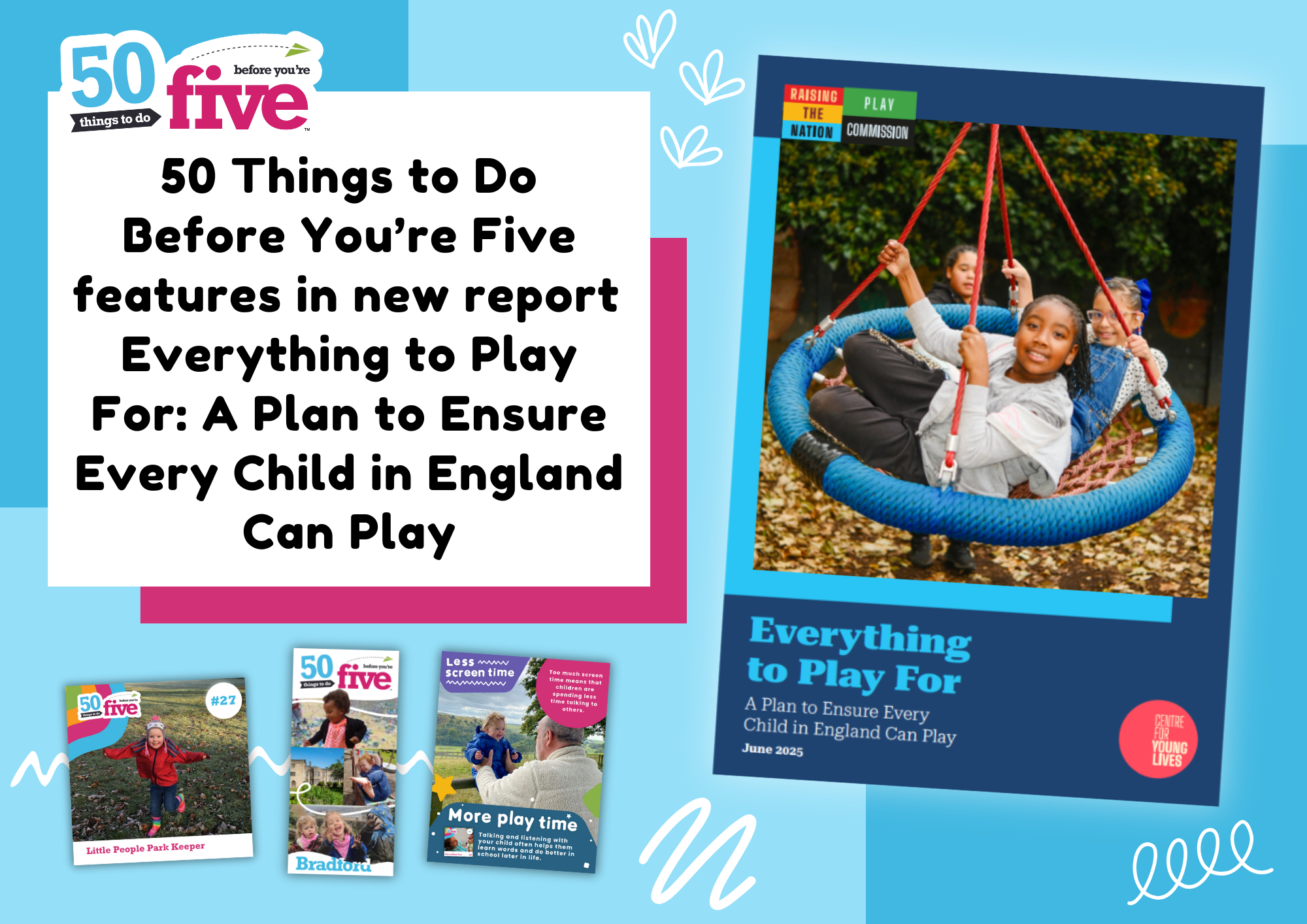
The Raising the Nation Play Commission is a year-long independent inquiry into why play is critical to the wellbeing and development of children, and how it can be restored to every childhood in England. It has published its second and final report, titled, ‘Everything to Play For: A Plan to Ensure Every Child in England Can Play’. It is the perfect day, the International Day of Play to celebrate the publication of a report that prioritises play!
The report cites our initiative, 50 Things to Do Before You’re Five, amongst others, as a powerful tool that not only promotes and encourages play, but also reverses the concerning trends we are seeing in young children. This includes the crises in obesity, mental health, school readiness, school attendance and overconsumption of screentime.
The final report puts forward a positive vision of a country where play is at the heart of government strategy, public spaces, and where it is embedded across education, health, local government and beyond. It argues for the restoration of play into early learning and our schools, for communities where safe parks, playgrounds, streets, and housing developments are alive with the shouts and laughter of children, and for a broader, cultural shift in attitudes towards risk, childhood independence, and play.
Prominently featured in the report is 50 Things to Do Before You're Five. The report says:
“50 Things to Do Before You’re Five provides screen-free ideas and activities for families with young children. This includes fun, low or no-cost experiences for the whole family, indoors and outdoors, which are great ways to support children’s development."
“Bradford Birth to 19’s 50 Things to Do Before You’re Five initiative … demonstrates that with the right kind of support - whether through financial aid, free resources, peer networks, or digital tools - parents feel more confident and engaged.”
The report argues that one of the reasons many children are spending increasing amounts of time doom-scrolling on addictive smartphone apps is due to there being fewer opportunities to play offline. It calls for play to become a political and policy priority, underpinned by national leadership, legal protections, and cultural change.
Its main recommendations include:
-
A new, cross-departmental National Play Strategy for England with a 10 year vision, led by a Minister with responsibility for Play.
-
A statutory Play Sufficiency Duty for local authorities, bringing England in line with Scotland and Wales.
-
Legal protections for children’s rights, including incorporating the UNCRC into domestic law, and protecting all children against discrimination in accessing play.
-
Child-friendly neighbourhoods as part of reviving a culture which embraces play and childhood independence and which gives parents confidence to allow their children to play again.
-
Schools are supported to harness the power of play for learning. Schools should be supported and required to develop their own play plans and there should be high quality training for school staff in play. Play should be embedded into the primary curriculum.
-
The National Planning Policy Framework and related guidance should be updated to require developers and planners to adopt pro-play policies in all new developments.
-
Parents and carers are supported and empowered to help their children to play. The Department for Education should introduce an awareness campaign for parents on the importance of play and how they can help their children to play.
-
Play is made a foundation of children’s early years, including the roll out of play-focused Family Hubs with parent play champions to support and encourage play.
-
Embed play in healthcare settings and recognise and use it as a tool to improve public health outcomes. The Department of Health should recognise the importance of play in its 10 year health plan and establish a national ‘play-on-prescription’ pilot.
The report also calls for the reimagining and better regulation of the digital lives of children. The report argues the Government’s National Play Strategy should include a specific commitment to a step-change in the quantity and quality of children’s use of digital devices. The Play Commission proudly supports our Less Screen Time More Play Time campaign, which focuses on reducing screen time for children under five and encouraging families to engage in play. The campaign hopes to engage parents, early years professionals, community groups, and healthcare settings to spread the message that screen-free play is vital for young children’s development.
50 Things’ ‘Less Screen Time, More Play Time’ campaign raises awareness of the impact of screen-time directly with families. It focuses on reducing screen time for children under five by encouraging parents to engage positively in play. 50 Things to Do Before You’re Five initiative is an ideal tool designed to promote practical suggestions for screen-free playful activities such as, puddle jumping, blowing bubbles and sharing stories. Families can try these low or no-cost activities at home and in their local community.
Christian Bunting, Executive Director of Birth to 19 said: “Birth to 19 are passionate about play, and we built 50 Things to Do Before You’re Five to promote play so that young children across the country can play more. 50 Things provides parents a list of simple playful activities that have such impact but above all, just great fun! Having family fun at home and in your local communities, helps build early language, positive mental wellbeing and helps create positive healthy habits that last a lifetime. Having started the 50 Things Before Five journey in Bradford six years ago, it’s amazing that across the British Isles 50 Things is on offer to well over half a million families today.
This report marks an important moment, when organisations across England come together to argue the case for play. By playing more and spending less time in front of screens, we will help young children be healthier and develop the communication and relationship skills they will need for life.”
Rebecca Oberg, Director: Institute for the Early Years at Birth to 19 said:
Paul and the team at Centre for Young Lives are doing vital work and today’s report should be seen as a catalyst for change. It is time for policy-makers to recognise the strong evidence base showing that play is an essential part of our lives and communities, including the fact it promotes effective learning and development.
Our commitment to play is reflected across all our work, but we are particularly pleased to see our 50 Things to Do Before You’re Five, and the associated Less Screen time, More Playtime campaign, in the report. The initiative was created to help parents and carers, especially those facing disadvantage, feel more confident about enjoying playful, engaging activities with their children.
Sian Hudson, Headteacher of St Edmund’s Nursery School said:
“At St. Edmund's Nursery School, play is what we do best! Playing works for children and involving our families too, through the "50 Things to Do Before You're Five" initiative, seamlessly extends the joy and importance of play from our nursery into homes and the community. Our "Better Together" days are a testament to this, bringing everyone together for enriching, playful experiences rooted in the "50 Things" activities.
We're passionate about outdoor play, often venturing out with children and their families to explore our local area – from the Bradford’s parks #27 Little People, Park Keeper, our wild woodlands #34 Woodland Wandering, to Bradford’s city centre fountains #44 Fountains of Fun. These adventures are brimming with fun and learning.
Our success at St. Edmund's Nursery School clearly demonstrates that play-informed strategies work. We firmly believe that extending this approach nationwide, with government support, would be transformative. Happy, active, healthy children playing outside together in safe spaces – that's what every family and community needs and truly deserves.”
Read more about the full report, here.
SHARE ON SOCIAL MEDIA
